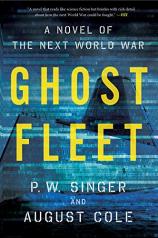Excerpt
Excerpt
Ghost Fleet: A Novel of the Next World War

10,590 Meters Below Sea Level, Mariana Trench, Pacific Ocean
Sometimes history is made in the dark.
As he scanned the blackness, Zhu Jin thought about what his wife would be doing right now. He couldn’t see her, but he knew that ten kilometers above, Liu Fang would be hunched over her keyboard, ritually tightening her ponytail to burn off the tension. He could imagine her rough sneeze, knowing how the cigarette smoke from the other geologists irritated her.
The screens inside the Jiaolong-3 Flood Dragon deep-water submersible were the only portholes that modern science could offer the mission’s chief geologist. His title was truly meaningful in this case. Lo Wei, the Directorate officer sent to monitor them, had command, but ultimately, responsibility for the success or failure of the mission fell on Zhu.
So it was appropriate at this moment, he thought, that he alone was in control, deep below the COMRA (China Ocean Mineral Resources Research and Development Association) deep-sea exploration vessel Xiang Yang Hong 18. This particular pocket of the Mariana Trench belonged to him alone.
Zhu guided the course underwater with a series of gentle tilts of the soft ly glowing control-sleeve gloves he wore. He was moving too close to the sheer trench walls to consider using the autopilot. He exhaled to clear his mind. There was so much pressure, poised to crush his vessel and everyone’s dreams at any moment.
He adjusted the headset with a nudge of his shoulder. There, just as he thought. Blinking, he leaned forward, as if proximity to the lightly glowing video screen and the crushing darkness beyond the sub’s hull could make the moment any more real.
This dive was the last; it had to be.
A wave of his hands, and the sub backed away from the wall and paused, hovering. Zhu turned off the exterior lights. Then he turned off the red interior lighting. He savored the void.
The moment had come. It was the culmination of literally decades of research and investment. No other nation had even attempted to plumb the depths of the sea like Zhu and his comrades, which was why 96 percent of the ocean floor still remained unexplored and unexploited. Indeed, the training alone for the deep-sea dive had taken a full four years once the team at Tianjin University developed the submersible. Compared to that, the five days of searching on this mission was nothing.
This descent, with Zhu at the controls, was the mission’s last shot. At some point soon, the team knew, the Americans would be paying them a “friendly” visit, or maybe they would have the Australians do it for them. The Chinese were too close to the big U.S. base in Guam; it was a wonder nobody had come to look into what they were doing yet. Either way, the clock was ticking, both for the COMRA vessel and, he worried, its crew.
He thought of Lieutenant Commander Lo Wei standing over Zhu’s wife’s shoulder, getting impatient, lighting cigarette after cigarette as she sneezed her way through the smoke. Zhu could almost feel the crew scrutinizing her face with the same intensity they viewed their monitors. They would think, but not say aloud, How could he fail us, when he knew the consequences for us all?
Zhu had not failed.
The discovery itself was anticlimactic. A screen near Zhu’s right hand flashed a brief message in blue and then flipped into a map mode. There had been indicators of a gas field here, but as the data streamed in, he now knew why his gut had guided him to this spot. He nudged the submersible on, sorting the deployments of the sub’s disposable autonomous underwater vehicles, which would allow the team to map the full extent of the discovery. Each vessel was, in effect, a mini-torpedo whose sonic explosion afforded the submersible’s imaging-by-sound sensors a deeper understanding of the riches beneath the sea floor. The sound waves allowed the computer to “see” the entirety of the field buried kilometers below the crust. The minitorpedo technology came from the latest submarine-hunting systems of the U.S. Navy; the resource-mapping software had originated with the dissertation research of a PhD student at Boston University. They would never know their roles in making history.
After thirty-five minutes of mapping, it was done.
Enough time in the dark, Zhu thought. The transition between the deep and the surface, he once confided to Liu, was the worst. To die there would be his hell, trapped in the void between the light of day and the marvels of the abyss. But this time it was his joy; the void filled with the sense of anticipation at sharing the news.
When he opened the submarine’s hatch, he saw the entire crew peering over the port rail, staring down at him. Even the cook, with his scarred forearms and missing pointer finger on his left hand, had come to gape at the Jiaolong-3 bobbing on the surface.
He squinted against the bright Pacific sun, careful to keep his face expressionless. He searched for Liu among the crew gathered at the ship’s railings. At the crowd’s edge, Lieutenant Commander Lo stood staring at him with a sour face, an unspoken question in his eyes. Zhu locked eyes with his wife, and when he couldn’t contain his discovery anymore, he smiled. She shouted uncharacteristically, leaping with both hands in the air.
The rest of the crew turned to stare at her and then began cheering. Just beyond them, a faint sea breeze lifted the Directorate flag hanging by the ship’s stern; the yellow banner with red stars fluttered slightly. To Zhu, it seemed like perfection, fitting for the moment. When he looked back to the rail, he noticed that Lieutenant Commander Lo was gone, already on his way inside to report the mission results back to Hainan.
U.S. Navy P-8, Above the Mariana Trench, Pacific Ocean
Even from eight thousand feet up, they could see that the people on the deck were celebrating something.
“Maybe the captain announced a pool party,” said Commander Bill “Sweetie” Darling from the controls.
Darling and his crew were on their way back from a check-out flight on the P-8 Poseidon’s recent engine upgrades. The plane had been designed for warship hunting, but there were none in the quadrant, and they were bored. The Directorate research vessel offered some excitement, at least as much as could be had in this corner of the Pacific.
The copilot, Dave “Fang” Treehorn, sent a live feed of the Xiang Yang Hong 18’s deck from the P-8’s sensor-pod cameras. The cockpit of the Poseidon, a Boeing 737 passenger jet modified to Navy specifications for sub hunting, was considered spacious by military standards. But military aviators always want more information, and Darling regularly flipped through the available sensor feeds on the cockpit screens to satisfy the craving.
“Time to head down and take a closer look?” asked Treehorn.
“No fair that they get to have all the fun today. If it’s a party, we should have been invited,” said Darling. “Make sure to zoom in and grab shots of that submersible; give the intel shop some busywork.”
“Registry says it’s a science expedition,” said Treehorn.
The P-8 dove smoothly down to five hundred feet, Darling banking the plane in a steep turn that kept the vessel off the starboard wing. A plane that big, that fast, and that low roaring overhead was disconcerting to any observer. The crew of the Xiang Yang Hong 18 would be on notice now.
“X-Ray Yankee Hotel 18, this is U.S. Navy Papa-8 asking if you need assistance,” said Darling. “We noticed you are stopped just over a rather deep hole in the ocean, not the best place for snorkeling.”
Treehorn started laughing, as did the rest of the P-8 crew listening in on the comms.
Darling brought the plane back up to a thousand feet. “That’s good; now maybe they can actually hear their radio,” said Treehorn.
“Got their attention, though,” said Darling.
“I’ll say. Check your screen. They’re hoisting the submersible and trying to put a tarp over it at the same time,” said Treehorn. “One guy just fell overboard.”
Then a voice came on the radio. Darling instantly recognized the command tone of a fellow member of the military brotherhood.
“U.S. Navy P-8, this is Zhu Jin, chief scientist of an official expedition of the China Ocean Mineral Resources Research and Development Association. We are in international waters, operating under scientific charter. Do you copy?”
“We copy, XYH 18,” said Darling. “I don’t want to get into the legalities, but these waters are protected U.S. Exclusive Economic Zone, as designated by the Mariana Trench Marine National Monument. Stand by. We will be vectoring a U.S. Coast Guard vessel to ensure that you are not engaged in illegal fishing.”
“Negative. This is a scientific mission. We do not need authorization. Any further interference with this peaceful mission will be considered a hostile act by the Directorate government,” said the voice. “Do you copy?”
“Well, that got nasty pretty fast,” said Treehorn to his pilot.
“Foreplay’s for chumps,” said Darling.
“Are we really calling in the Coasties?” asked Treehorn.
“Naw. I guarantee they aren’t fishing, but no need to start a war over it,” Darling responded.
“We copy, XYH 18,” he said into the radio. “Papa-8 is leaving station. You lost one overboard, don’t forget.”
Darling brought the P-8 up to three thousand feet and powered back the engines, giving the big jet a near weightless moment. Then Darling brought the P-8 around and pointed the nose down at the Chinese ship’s stern, backing off the twin engines’ power even more, so that the almost ninety-ton jet’s dive was nearly silent.
“We’re not done yet. I’m going to take her low, and when they’ve got their heads down, we drop a Remora two thousand meters off the stern,” said Darling.
“Aye, sir,” said the weapons crewman. “Standing by.”
Xiang Yang Hong 18, Mariana Trench, Pacific Ocean
Lieutenant Commander Lo handed the radio’s mike back to the captain.
“This is taking too long,” said Lo. “We need to be gone before their border-guard ship arrives. Dr. Zhu, do you have everything that your team needs?”
“Yes, we could do more surveys, but it is —”
A roar shook the entire ship. Zhu hit the deck with his hands over his ears. There was a flash of gray as the P-8 went overhead at full power less than a hundred feet off the starboard side.
Lo couldn’t help but admire the move. Spiteful, yet audacious. The scientist felt like he might throw up.
As the jet’s thunder receded, one of the crew shouted, “Something in the water, a torpedo behind us!”
“Calm down,” said Lo, standing with his hands on his hips. “If it was a torpedo, we’d already be dead. It’s just a sonobuoy, maybe one of their Remora underwater drones.”
“Do they know?” said Zhu.
“No, there’s nothing up here of interest. What matters for us is far below,” said Lo, nonplussed, as he eyed the drone now following in their wake.
He turned back to the scientist. “And Zhu?” said Lo. “The leadership is aware of your success. Enjoy the moment with your wife. And make sure the submersible is secured.”
It was the first kind word he had ever said to Zhu.




